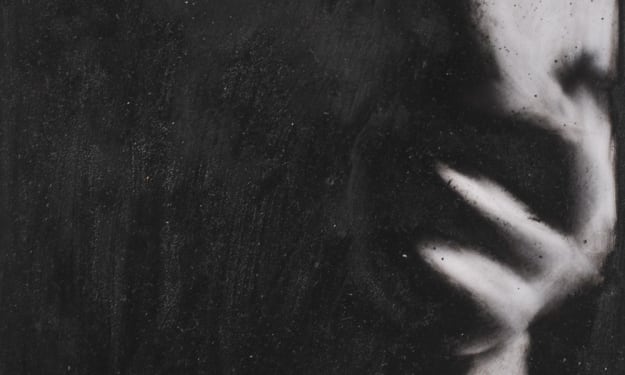
The writer waits for one of the two elevators to arrive. Floor four, floor five, floor six, it rises to greet her. Impatiently the writer gazes out the window at the parking lot below, with its cars nestled neatly side-by-side, their black windows blinking in the sun. Outside sprawls the gray cement city, several dog-owners are taking their daily stroll along the bike path. Overzealous bikers zip past the lowly bipedal pedestrians. Internally, the writer wonders how many lifetimes could be fitted into this singular, sprawling, finite moment.
Abruptly a voice unleashes itself, garbled and blaring, into the empty hallway. The voice is coming from the call box to the elevator, and for a moment the writer wonders if she needs to respond. It is her first response, but she realizes that she has no idea what the voice has said. And then the voice is gone, just as abruptly as it came. The writer hastily examines the call box for some button to use. Perhaps there is someone stuck in the elevator and they are reaching out for assistance. The writer realizes that she has no idea how the emergency phone in an elevator works, a possibly embarrassing thing to not know at the age of twenty-six.
“Garble garble garble,” the voice comes through again, just as suddenly as it had gone. Once again the writer frantically searches for a button, but once she finds it she is overcome with anxiety over whether or not she should press it.
“Hello?” she tentatively asks, directing it at the call box but realizing that from the perspective of hypothetical onlookers it could look as if she is asking the hallway. Crazy. She decides not to press the button, for no other reason than she doesn’t want to find out what happens when she does.
“It garble take garble more garble garble garble,” the voice comes through.
The writer stares bewildered.
And then a haunting thought comes, slipping easily in from somewhere deep, dark, and cavernous. Maybe she was the only one that could hear the voice.
When the writer was twelve her family took a trip to tour a limestone cave in Idaho. The writer vaguely remembers not caring for such an adventure, but once they reached the mouth of the cave and even more so when they were inside, the writer had the distinct feeling of déjà vu. Something old, something ancient, had come to greet her at the mouth of that cold dark cave. It had been threatening, malicious. Pillars reached from the ground, grasping towards the pillars that reached from the ceiling, neither of them touching, even with thousands of years to do so. Her mind kept yelling at her that she had been here before, and to get out. It took her some time to realize that she was alone, somehow separated from the group. The last thing she remembered was the squeak of her brother’s lime green crocks, squeaking and squawking from sweat and condensation. She had no memory of how she could have become isolated from the group. With no idea how to move on or how to return to the surface, the writer had curled up into a ball on the moist, chilled, packed dirt floor willing the shadows to not consume her. That was how her family had found her, regressed to animal instinct. That was the feeling that overcame her facing the call box.
The writer looked around for someone to confirm that they too heard the voice emitting from the call box, but found herself utterly alone on her apartment floor. She shivered.
“What garble mean garble how garble,” the voice came again, somehow more loudly this time.
The writer convinces herself that she could not be the only one hearing this disembodied voice. Then again, that’s not entirely true. For all she knows, with no one to corroborate, she very well might be alone and hearing voices.
Her grandfather had had schizophrenia.
Immediately she shoves the thought down. No.
As if to save her from her own mind, the elevator on the right arrives, floor six. Perhaps there is something wrong with the left elevator, and that is why it took so long to reach her. She examines her watch, it couldn’t have been more than sixty seconds that she had been waiting, and yet it feels like an eternity.
The writer brushes off the feeling of time holding her captive and steps into the elevator, willing it not to hold her similarly captive. She now views the elevator as some kind of beast that can entrap and imprison her. Her heart rate races as she watches the digital screen count down the floors. Floor five, floor four, floor three, the screen counts down. She wills it to carry her to the lobby and then free her, just as it was designed to do.
Walking along the bike path the writer feels the strange encounter with the voice and the call box dissolve. It is amazing how quickly the mind can reset itself, preserving some form of normalcy that was previously unthreatened. There is delightfully warm sun, talkative trees, a joyful blue sky, and merry little suicidal squirrels dashing in front of bikers zipping along. She focuses on the task at hand, going to the shops for bread and butter. The writer smiles, untroubled, her head fully at peace.
The shops had been packed for the middle of the day, the writer had had to squeeze past daft and unobservant patrons who seemed incapable of being able to see her. However, she got the task done, and she should have enough food to last the week. On her way back to her apartment the writer passes a group of large condos, the kind that has several floors and yet is still connected to their fellow neighbors. The faint sound of music drifts onto the bike path, and the writer is suddenly gripped with the fear, the black cave of her mind opening to swallow her whole, maybe only she can hear this music. She searches anxiously for someone else to confirm the noise, or for some confirmation of where it is coming from. There is no one on the path or in front of the condos. Now the writer is ill at ease, bile and panic rising in her throat. Her heart pounds.
Surely if she were hallucinating, it would be directed at her.
A scene forms in the writer’s mind, whether real or imagined the writer knows the sentiment is true. It is past midnight. Her mother is sitting at the kitchen table, back hunched, her face is cradled in her hands as if they have fused together. Once her mother had had luminous black hair. Now her hair is lackluster and stringy, it hides what little of her face is exposed by her hands. The writer remembers thinking her mother didn’t look quite human, but she couldn’t put a pulse on what creature her mother had become. In the next room her mother’s father, the writer’s grandfather, is shouting. “YOU’RE TRYING TO MURDER ME. YOU’RE TRYING TO MURDER ME!” He accuses over and over the empty air or perhaps the curtains. Even though she cannot see it, the writer knows that her grandfather is brandishing a kitchen knife. His eyes are wild, he is being held captive by whatever is only real to him. Her mother stays hunched at the kitchen table, defeated and worn thin. Her grandfather had come to live with them only two months prior, refusing to take his medication, waking the entire house with his cries.
There had been no doubt that her family loved her grandfather. Just as he was prone to shouting at hallucinations he was also prone to sharing a joke or exchanging a knowing smile whenever her mother burned something in the kitchen. Yet his presence had eaten away at the wholeness of her family like he had been a moth that devoured parts of their winter clothes. Whatever completeness had been before he came to live with them had been disbanded, torn apart. Each had fractured off in their own ways of coping. They were not medical professionals, they had little understanding of mental illness, and it had left them ragged and threadbare. Even to this day, the writer felt exhausted and fearful when remembering her grandfather. As a staunch atheist the writer had never feared ghosts or demons, but failing mental health, that was true horror. She had witnessed firsthand how failing mental health can ravage a single life, an entire family, and it frightened her more than she cared to admit.
The writer musters all her internal strength to move forward, and as she does the music becomes less audible. Relieved at the natural turn of events, the writer reassures herself that she can’t be ill. It's simply the prison of her mind and the reality of living alone for too long that are getting to her.
Once home, the writer can’t shake the notion that she could be losing her mind. She is aware that schizophrenia usually makes itself known in one’s twenties, which means she is still in the danger zone. The writer convinces herself that the tail end of the “danger zone” is less dangerous than the beginning or middle. Repeatedly she examines the events, she never saw inside the left elevator, therefore someone could have been in it. Desperately the writer wished that she didn’t live alone, that there was someone to confirm her sanity. She briefly pondered calling her brother, but there was the fear that without the tangible body, she might be inventing speaking to her own flesh-and-blood.
The primordial fear returned, the cave so dark and dank it becomes impossible to see, like a sheet that has been drawn over one’s face and pulled tight. If no one is around to share an experience, can one safely has that it happened? Or didn’t? Being part of a social structure, being a social animal, the social man, had its limitations and restrictions.
The writer never hears the voice again, weeks and months drip into years, but she can never be sure that she hadn’t invented it, the garbled voice, in some cavern of her mind. She never tells anyone her fear, the incomprehensible horror of losing one’s own mind. To become beholden to something else, the whims of a malfunctioning brain. The fear always presents itself, twisting her gut and fluttering her heart, that perhaps for one moment she wasn’t as sane as she assumed, and perhaps the voice could return, reducing her to the cave inside her mind.
About the Creator
Ann Herrold
A freelance writer that shares her experience with PTSD, trauma, depression, life, and love. Part of the LGBTQIA+ community, master procrastinator, bog goblin and expert pie eater.






Comments
There are no comments for this story
Be the first to respond and start the conversation.